江苏省射阳县第二中学高三英语复习:定语从句
江苏省射阳县第二中学高考英语牛津译林版二轮专题复习课时提升练——第二部分专题三代词【含解析】

Ⅰ. 单项填空1 . (2015 ·合肥市模拟 )Someone knocked on the door and Jimmy hurried to seewho________was.A. one B. it C. he D. that答案 B [ 考察代词。
句意:有人叩门,吉米仓促去看是谁。
当不知道或没必需知道对方的性别时用it表示。
]2.(2015 ·大庆市六校联考)I've always wanted an iPhone and I've just saved enough money to buy________.A. it B. this C. that D. one答案D[ 考察代词。
句意:我向来想要一个iPhone手机,并且我刚才攒够了钱要去买一个。
one 常用来指代上文提到的同类事物中的“一个”,表示泛指。
应选D。
] 3.(2015 ·江西要点中学 5 月联考 )The cultural background of China is totally different from________of the US.A. one B. that C. these D.those答案 B [考察代词。
句意:中国的文化背景与美国的完整不一样。
that指代前文提到的that指代 The cultural background。
]单数可数名词或不可以数名词,故此处用enjoyable, 4.(2015·陕西咸阳高考模拟考试)Listening to music can beverybut________can be appreciated unless you like it.A.nothing B. somethingC. everything D. anything答案 A [ 考察代词。
句意:听音乐是一件很舒适的事,可是除非你喜爱它,不然什么也赏识不了。
江苏省射阳县第二中学译林牛津版选修九英语导学案Unit1 Other countries,other cultures之定语从句复习
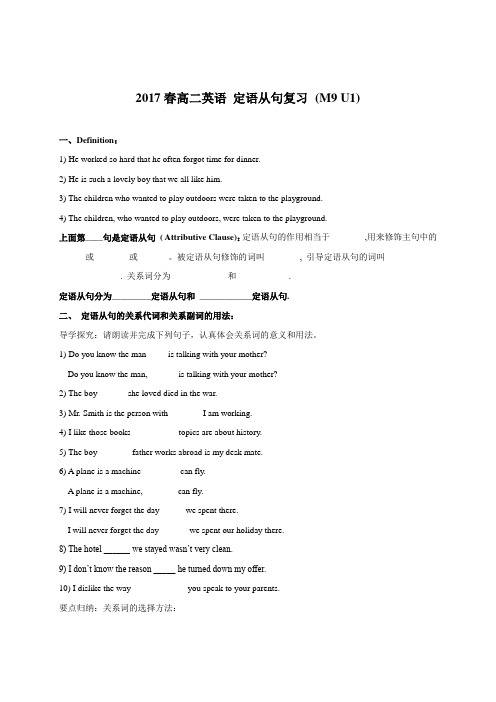
2017春高二英语定语从句复习(M9 U1)一、Definition:1) He worked so hard that he often forgot time for dinner.2) He is such a lovely boy that we all like him.3) The children who wanted to play outdoors were taken to the playground.4) The children, who wanted to play outdoors, were taken to the playground.上面第____句是定语从句( Attributive Clause):定语从句的作用相当于________,用来修饰主句中的______或_______ 或_______。
被定语从句修饰的词叫________, 引导定语从句的词叫______________. 关系词分为_____________和____________.定语从句分为_________定语从句和____________定语从句.二、定语从句的关系代词和关系副词的用法:导学探究:请朗读并完成下列句子,认真体会关系词的意义和用法。
1) Do you know the man ____ is talking with your mother?Do you know the man, ______ is talking with your mother?2) The boy ______ she loved died in the war.3) Mr. Smith is the person with _______ I am working.4) I like those books __________ topics are about history.5) The boy _______ father works abroad is my desk mate.6) A plane is a machine ________ can fly.A plane is a machine, _______ can fly.7) I will never forget the day _____ we spent there.I will never forget the day ______ we spent our holiday there.8) The hotel ______ we stayed wasn’t very clean.9) I don’t know the reason _____ he turned down my offer.10) I dislike the way ____________ you speak to your parents.要点归纳:关系词的选择方法:1、只用that,which或who(m) 的情况导学探究:完成下列句子, 体会什么时候用that, 什么时候用which,什么时候用who(m)。
江苏省射阳县第二中学高中英语必修二(Unit1 Tales of the unexplained

模块二Unit1 Reading活动单(1)(Unit1 Tales of the unexplained )Period I---Reading Comprehension 班级____________姓名_____________学号_________自我评价_____________【学习目标】Arouse their interest in learning this unit through activities.【学习重难点】Improve Ss’ reading ability. Enable Ss to master some important language points.【活动方案过程】Activity one ( Welcome to the unit ) Please read the instruction and focus on the five pictures and illustrations first; then answer the following questions (阅读第一页内容,讨论下列问题)1) Do the four pictures have something in common? How do you feel about them? Are you a bit curious? _____________________________________________________2) Fill in each blank with one correct word according to your knowledge( 依据个人背景知识,完成表格)Activity Two Reading ( Boy missing, police puzzled )1) Fast reading go through the passage quickly , then find answers to the following questions (快速阅读抓要旨)1. What is the article about? ___________________________________2.When was Justin last seen ? ___________________________________3.Who is in charge of the case? ___________________________________ 2) Careful reading.Task-based reading.(任务型阅读,阅读课文,完成下面表格,每空一词)Choose the best answer to each question:1. What can we learn from paragraph 1, _________.A. Justin was killed by YetisB. people showed great interest in Justin Foster’s being missingC. the police have dis covered the truth of Justin’s being missingD. Justin went lost last night2. In the second paragraph, “show up” means_______.A. arrive or appearB. reachC. disappearD. reach for3. From the third paragraph, we know that________.A. Justin did not go home that nightB. after the game Justin spent the night with a friend that nightC. Justin returned home that nightD. Justin was playing baseball with a friend all the night.4. According to Paragraph 5, we know that __________.A. the light that Kelly saw was the light of the full moonB. the spaceship was white all overC. Kelly saw the aliens take Justin awayD. Kelly was quite sure that the aliens took Justin awayActivity Three : 完成课后4—5页练习。
江苏省射阳县第二中学高中英语必修二课件:M2U3 Grammar and usage
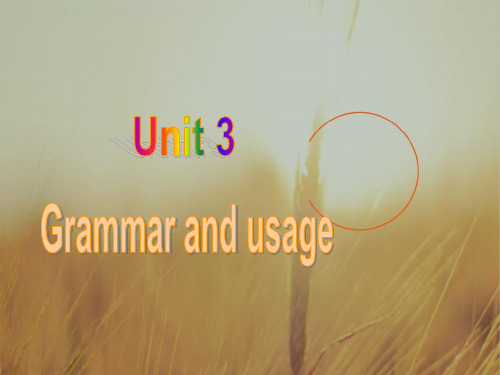
3. The tomb contained more treasure than any of us ____ everh_a_d__ bseeefnore, …
4. Upon their entering the tomb, Carter’s lucky pet bird, which he h_a_d__le_f_t in Cairo, …
Then, a few months after Carter had opened
the tomb, Lord Carnarvon fell ill with a fever
and died.
Past
Present
Carter opened King
Lord Carnarvon
Tutankhamun’s tomb. died.
for I _____ of it earlier.
A. hear
B. heard
C. have heard
D. had heard
Past perfect tense 过去完成时
Form: had + done
Read the points and examples on Page 48, and answer: 1.Which action happens first in the sentence
she had seen. (新概念二册)
8. How long had the police taken to find
his bicycle? (新概念二册)
Observe the sentences from this unit.
1. By the 1920s, he had become an explorer, searching for the tombs of the Egyptian kings.
江苏省射阳县第二中学高三英语一轮复习(M4 U2)

高三英语一轮复习(M4 U2)一、单词1。
adj.单独的,分开的,不同的2. vt。
点燃;照亮3。
n。
&vt。
尝试,努力4。
n。
极限;界限,限度5. ___adv. 否则,要不然6。
n。
技术,技法,技巧7。
n. 对手,竞争者8. vt. 去除,去掉;移开,拿开9. adj。
先前的,早先的10。
n. 平衡11. n.缺席,不在场12. vi. 退役;退休13. n。
要求14。
vt。
保证15. n. 分支;分部16.adj。
光荣的,可敬的→n.荣誉,光荣;敬意,尊敬17。
adj。
愉快的,高兴的→v.&n。
→adj。
令人高兴的18。
vi。
比赛;竞争→n。
→n. 竞争者,比赛者19。
n.重要性,重要意义→adj.重要的;意义非凡的20。
adv。
和平地;平静地→adj. →n___________.和平,平静21. n。
吸引人的地方或事情→v。
吸引→adj.有吸引力的22. n.起源,由来→adj.最初的,原来的;新颖的→adv.24. v。
实践,经常做,从事→n.→adj。
实践的,实际的25。
adj。
涉及的,卷入的→vt.使卷入,连累二、短语。
1. 与某人分享某物2。
参加3。
纪念…… 4. 并肩地;一起5。
打破纪录6。
对……做出贡献7。
扮演角色;起作用8。
盼望9。
许多;大量10. 旅游景点11. 对某人有帮助12。
注意13。
保护某人免受14. \新的社团成员15. 期望16。
提建议17. 失去平衡18. 牵涉,卷入19. 与……类似20. 受……欢迎21。
使……处于控制之下22. 给……让路,让位三、句型1.无论他作出什么决定我都会支持的。
decision he made,I would support it.2。
他没有来,这使我们感觉到晚会很难进行.His not coming for us to go on with the party. 3。
这是我读过的最有趣的书之一。
It is one of the most interesting books(that)I .4。
高三英语一轮复习---定语从句讲义(精编文档).doc

【最新整理,下载后即可编辑】定语从句(一)基本概念1.由一个句子作定语,修饰句中一个名词或代词,有时也可以修饰整个句子或句中的部分内容,这样的从句就是定语从句,被其修饰的名词或代词叫先行词。
2.关系词分为两大类,即关系代词和关系副词,其作用一是引出一个定语从句,二是代替其所修饰的先行词,三是在句中充当某个句子成分。
关系词的分类和基本用法本部分的内容比较复杂,为便于考生一目了然,我们试图用表格的形式呈现给考生。
1.that与which, who, whom的用法区别当关系代词作介词宾语,且该介词不是和从句的谓语动词构成固定短语时,介词可以提前,这样就出现“介词+关系代词”。
先行词指物,用“介词+which/whose”,指人则用“介词+whom/whose”, 且两个关系代词均不能省略。
介词的选择要遵循两个原则:定语从句一般紧接被它所修饰的先行词;但有时候它和先行词之间有可能插入其他成分,使它与先行词分隔开来,这种定语从句叫作被分隔的定语从句,在阅读文章时会经常遇到这种情况,在阅读是要注意识别先行词的修饰对象。
▲定语从句与习惯句型用一个恰当的词完成下列句子,使之完整与正确。
①It is the first time _____ she has been in Shanghai.②It was the time _____ Chinese people had a hard life.解析:这里①小题是一个习惯句型,其结构为:It is/was the first /second ...time +that从句。
故①填that,其意为:这是她第一次在上海。
②小题the time是先行词,其后是表示时间的定语从句,故填when。
▲定语从句与简单句用一个恰当的词完成下列句子,使之完整与正确。
①The mother told the lazy boy to work,_____ didn't help.②The mother told the lazy boy to work._____ didn't help.解析:含有定语从句的复合句与两个单句的主要区别在于:前者有主句,有从句,必须有关系词;而后者则是两个单独的句子,不需要任何关联词。
江苏省射阳县第二中学高中英语必修一课件:M1U3P4Grammarandusage
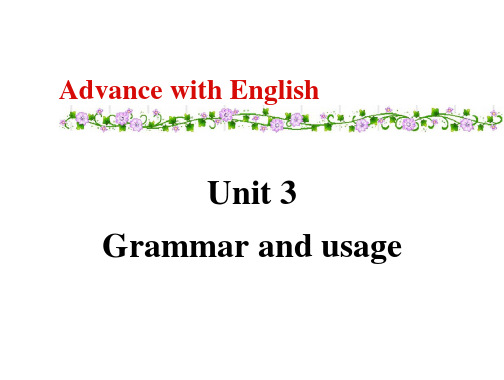
Advance with EnglishUnit 3Grammar and usageNon-restrictive attributiveclauses非限制性定语从句skinny adj.极瘦的,皮包骨的lift vt.举起consider vt.考虑effect n.效果,作用;影响affect vt.影响sportsman n.运动员n ・取肌 n. & vt.冒险 n.(在网上发布的)帖子副作用(头发等)脱落 achievementrisk postside effectfall outWho is he?*The man who/that issitting there is Brad Pitt.*The man who/whom/that/- she speaks to isBrad Pitt.*The manto whom shespeaks is Brad Pitt.Cecilia, who took weight-loss pills, now realizes thathealth is important.Cecilia ,whose body isthin, still wants to lose some限制性定语从句与先行词之间不用逗号隔开;Who is she? weight (减肥).非限制性定语从句与先行词之间一般用逗号隔开。
My cousin whose father is a teacher wants to be an actor.My cousin,whose father is a teacher,wants to be an acton1.A・ This is the place where I lived ten years ago.B・ She is going to spend the winterholiday in Macao, which returned to \ China in 1999. i i 2.A. He is a man who I can ask for help・羹B・ His father, who works in Beijing, 1 came back yesterday.限制性走语从句和先行词关系密切>如果去掉从句,剩余部分意义不完整;非限制性走语从句只是先行词的附加说明>如果去掉从句>意义仍然完整。
江苏高考英语复习 定语从句
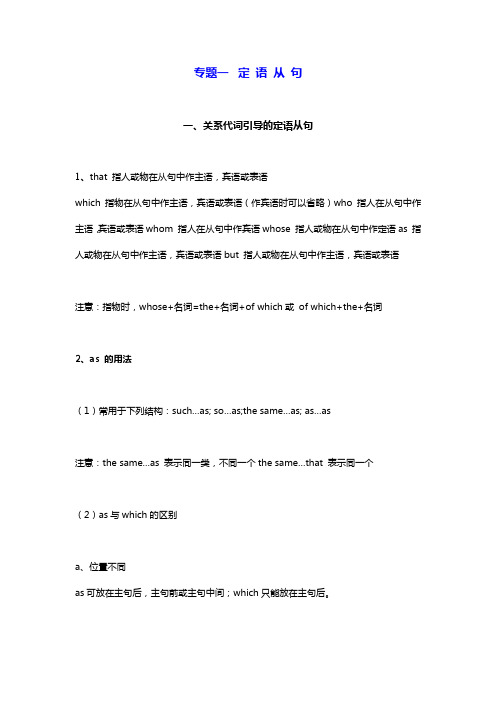
专题一定语从句一、关系代词引导的定语从句1、that 指人或物在从句中作主语,宾语或表语which 指物在从句中作主语,宾语或表语(作宾语时可以省略)who 指人在从句中作主语,宾语或表语whom 指人在从句中作宾语whose 指人或物在从句中作定语as 指人或物在从句中作主语,宾语或表语but 指人或物在从句中作主语,宾语或表语注意:指物时,whose+名词=the+名词+of which或of which+the+名词2、as 的用法(1)常用于下列结构:such…as; so…as;the same…as; as…as注意:the same…as 表示同一类,不同一个the same…that 表示同一个(2)as与which的区别a、位置不同as可放在主句后,主句前或主句中间;which只能放在主句后。
b、as起连接作用,表达说话人的观点、看法,并指出主句内容的根据或出处,意为“正如,正像”。
Which相当于并列句,可以用and this来代替,意为“这一点,这件事’”。
注意:as常用于下列结构:as we know/ as is known to all, as we all can see, as has been said before/above,as might be excepted, as is often the case, 一般不能用which代替as。
c、在从句中作主语时,which既可作系动词be的主语也可作实义动词的主语,而as 只可作系动词be的主语。
二、只用that不用which的情况1、先行词为all , much, everything, nothing , something ,anything, nothing, none, the one等不定代词时。
2、先行词被only, any, few, little, no , all, just , very ,right等修饰时。
江苏省盐城市射阳县第二中学2014届高三英语下学期 词汇补充

某某省某某市射阳县第二中学2014届高三英语下学期词汇补充1.assignment n 任务;作业2.blonde n 白肤金发碧眼女人3.booklet n 小册子4.bumb v&n 撞,碰撞5.bureaucracy n 官僚,官僚主义6.businesswoman n 女商人,女企业家7.bye int 再见8.capable a 有能力的,能干的be capable of doing sth=be able to do 有能力做某事9.career n 职业;事业;生涯10.Catholic a 天主教的11.chairwoman n 女主席,女会长,女议长12.charity n 慈善,慈善机构13.chase v&n 追逐,追赶,追求14.circumstance n 情况,情形,环境under/in no circumstances 绝不15.claim v&n 声称;认领;(根据权利)要求;夺去(生命);(n)说法16.clause n 从句;条款17.client n客户18.clue n 线索,提示19.code n 密码,代码20.collapse v 突然倒塌;(因病或虚弱)突然倒下/晕倒;崩溃21.column n 圆柱子;印刷的纵列;专栏22.mission n 委员会;佣金;回扣23.munity n 社区,团体24.plain v 抱怨,发牢骚;投诉25.plaint n 抱怨;投诉26.prehension n 理解,理解力27.confindential a 某某的,某某的28.considerate a 考虑周到的,体谅的,体贴的29.contact v&n 接触,联系30.context n 上下文,语境31.contract n 合同32.cooperation n 合作,协作33.cope v (成功地)应付34.council n 议会35.county n 县;郡36.crack v 碎裂;破裂;(使发出劈啪声);裂缝;裂痕;劈啪声37.crisis n 危机38.critic n 评论家,批评家39.critical a 批评的,挑剔的,危急的;紧要的40.criticism n 批评41.criticize v 批评42.current a 现在的,当前的;n 潮流;水流;电流43.cute a 可爱的,聪明的44.define v 给…下定义45.definite a 明确的46.definition n 定义47.deliberate a 故意的,有意的48.demanding a 要求高的49.deny v 否认;(接双宾语)剥夺,不允许denydoing/having done 否认做过There is no denying that…不容否认…50.depression n 沮丧,忧郁;萧条,不景气51.despite prep 尽管=in spite of52.detail n 细节53.device n 装置,设备54.display v&n 展览;陈列;展示=show,exhibition55.domestic a 国内的;家庭的=household;驯养的56.drown v 淹死,使淹死57.drum n 鼓58.Easter n 复活节59.economic a 经济(学)的60.econnomy n 经济,节约61.efficient a 效率高的;能干的62.elderly a 上了年级的63.element n 元素;要素64.emphasize v 强调=stress;着重65.empire n 帝国66.employment n 雇佣;就业67.enable v 使…能够68.engineering n 工程学69.English n&ad 英语;(总称the~)英国人;英语的,英国(人)的70.ensure v 确保,保证71.entitle v 给..冠名/称号;给予..权利/资格72.essential a 必不可少的,本质的73.estsablish v 建立,创办=set up; found;确立74. evil n 罪恶 a 罪恶的,邪恶的75.exception n 例外76.extend v 延长,延伸;伸展77.facility n 设施78.factor n 因素;要素79.fascinating a 迷人的,极美的be fascinated by/with/at 为…所迷80.fashion n 时尚,时髦;流行款式81.fate n 命运82.feature n 特征,特点 v 以…为特色,是…的特征83.formal a 正式的84.fund n 资金,基金;vt. 为…提供资金,资助=finance85.gap n 差距,鸿沟;裂缝,缺口86.gene n(遗传)基因87.guy n 家伙,小伙子88.gym=gymnasium n 体育馆;健身房89.heating n 供暖系统90.hell n 地狱;(the~)究竟,到底91.historic a 历史上著名的或重要的historic invention 具有历史意义的发明92.historical a 历史的,有关历史的93.household n 家庭;一家人;a 家庭的,家常的94.hungry a 饿的95.illustrate v 给…加插图;举例说明96.image n 画面;图像;(人或组织给予公众的)印象,形象97.immdeiate a 立刻的98.impact n 影响;冲击力,撞击力99.imply v 暗示;意味着=suggest 100.improvement n 改进,改善,提高101.individual a 单独的,个别的;n个人,个体102.infection n 感染,传染103.infer v 推断104.inflation n 通货膨胀,物价上涨;充气105.inner a 内部的,内心的(反outer)106.install v 安装=set up/ fit107.instance n 实例=example108.insult v 侮辱,辱骂109.insure v 给…投保110.intellectual a 智力的,脑力的111.internal a 国内的=domestic;内部的,体内的112.invest v 投资,投入113.investigate v 调查114.involve v 使卷入;涉及;包含,需要115.issue n 议题,争论的问题;(刊物的)一期;发行,发布116.item n 项目;条款;物品117.joint a 共同的,联合的;n 结合处,关节118.junction n (铁路公路等的)交叉路口,汇合处119.justify v 为…辩护;证明(别人认为不合理的事)有道理(或正当)120.keen a 渴望,热衷于;敏锐的dder n 梯子ndscape n 风景,景色ne n 乡间小路;车道;小巷,胡同ptop n 便携式电脑,笔记本电脑ter ad 以后,后来;较晚地126.leadership n 领导;领导地位,领导权127.liberal a 开明的,心胸开阔的=open/tolerant;慷慨的,大方的=generous128.liberty n (言论行动等)自由=freedom129.limited a 有限的130.literally ad 按照字面意思;逐字地;确实(加强语气)131.loan n 贷款132.location n 地点,位置133.lost a 迷路的,迷失方向的;丢失的,找不到的;不知所措的134.maintain v 维持,保持=keep;维修保养135.margin n(书等的)页边空白处136.marvellous a 令人惊叹的,极好的=wonderful/great/extremely good 137.massive a 巨大的,极大的138.maybe ad 可能,大概,也许139.migration n (一大群人尤为找工作的)移居,迁移;(鸟或兽季节性的)迁徙itary a&n 军事的,军人,军方141.minor a 较小的,较次要的;vi副修;n.副修科目142.miserable a 痛苦的,悲惨的,不幸的143.misery a 痛苦,苦难,极大的不幸144.mm=millimeter n毫米145.mood n 情绪,心情in a good/ bad mood 心情好/不好146.moreover ad而且,此外=besides/ furthermore147.mug n (喝茶、咖啡、啤酒用的有柄的)大茶缸,大杯子148.muscle n 肌肉149.mystery n 谜,神秘的事物=puzzle 150.nasty a 极差的,糟糕的;(气味)难闻的;令人作呕的;恶意的,卑鄙的;严重的151.negative a否定的;消极的152.negelect v 忽视,疏忽153.nevertheless ad 尽管如此,然而,不过155.No.=number n 数字,156.nonsense n 胡说,废话=rubbish 157.no way ad 不行,绝不158.numerous a 许多的159.objective n目的,目标160.objective a 客观的161.odd a 古怪的,奇特的;奇数的;单只的,不成双的162.omit v 省略;遗漏;忽略163.opportunity n 机会,机遇164.opposition n 反对;对手;在野党165.option n 可供选择的东西166.oven n 烤炉,烤箱167.overall a 总的,全面的 ad 总的来说168.panel n 画板;嵌板;(汽车上的)仪表板;(专家或专门)小组;陪审团169.pants n <英>短衬裤;<美> (长)裤子170.peak n&a 山顶,顶峰;(记录的)最高峰171.penalty n 惩罚,处罚;罚金,罚款;(体育中)判罚172.performer n 表演者,执行者173.philosophy n 哲学174.pizza n 比萨饼175.player n (球类或棋类的)运动员;播放机;演奏者176.poetry n (总称)诗歌177.policewoman n 女警察178.poverty n 贫穷,贫困179.priority n优先考虑的事;优先权180.proof n 证据,证明 ad耐…的,防…的181.proposal n 建议,提议182.propose v 提议;求婚183.qualify v 使有…资格,使胜任qualify sb for/to do/as 使某人有资格做…qualified ad 有资格的,胜任的be qualified for/to do/as 有资格做..;胜任..184.raincoat n 雨衣185.realsitic a逼真的,现实的186.recall v 回忆起,召回187.regarding prep 关于,至于188.region n 地区=area189.release v&n 释放;发行;上映;公开发表190.relieve v 缓轻,减轻(痛苦,焦虑等);解除某人职务relieve pain/pressure 减轻痛苦/压力relieve sb of…解除某人的…191.remaining a 剩余的(置于名词之前)192.resource n资源natural resources 自然资源193.reveal v 揭示,揭露;透露,泄露(秘密)=let out;显示出=show194.revenue n (公司,机构的)收入,收益;(政府的)税收195.route n 路线196.ruler n 统治者;尺197.rural a 乡下的,农村的,田园的198.sake n 目的;缘故;利益for the sake of…=for …’s sake 为了..的缘故for one’s own sake 为了自己的利益199.salseswoman n 女售货员200.scale n 天平,称;刻度;比例;规模201.scarce a 缺乏的,不足的,稀少的202.scheme n 方案203.secondary a 次要的,中等的204.sector n 部门,行业,区域205.series n 一系列,一连串a series of 一系列(谓语动词单复数看series)a TV series 电视连续剧206. setting n (小说等的)背景,环境207. sexual a 性的;性别的;与性有关的208. shocking a 令人震惊的209.sidewalk n 人行道210.sin n (违反某某戒律或道德规X的)罪,罪过,罪孽211.site n 场所;地点;(建筑)工地;用地;遗址,旧址212.slap v 掌击,拍打,打(耳光)213.snap v (使)啪的一声折断或关上;给…拍快照,快摄(照片)214.solution n 解决方法215.solve v 解决216. somewhat ad 稍许,有点217. sore a 疼痛的,酸痛的218. source n 源头;来源,出处219.spoil v 破坏,糟蹋;宠坏,溺爱;(食物)变质220.staff n 全体工作人员221.stall n 货摊,摊位,售货亭222.stock n 股票,证券;库存,储备223.stretch v 延伸,伸展(胳膊,腿,腰);使变大;使变长224.structure n 结构,建筑物225.stuff n 材料,东西;v 填,塞226.submission n 屈服,顺从227.sufficient a 足够的,充分的228.sum n 总数,总和;一笔钱; v 总结,概括229.sunshine n 阳光230.surgery n 外科手术231.survey n 调查232.sustainable a 可持续的,不破坏环境的233.table tennis n 乒乓球234.tank n 油箱,罐,桶,槽;坦克235.territory n 国土,领土;领域236.threat n 威胁237.threaten v 威胁238.trail n 足迹;小道,小径239.tansfer v&n 转移;迁移;调动;转乘240.transportation n 运输,运输系统241.trememdous a 极大的,巨大的;绝妙的,极棒的242.tunnel n 隧道,地道243.underneath prep&ad 在…下面244.vary v 呈现不同;(使)变化245.weapon n武器,兵器246.weird a 古怪的247.whoever pron (引导名词行从句)任何…人= anyone who;(引导让步状语从句)无论谁,不管谁=no matter who248.with prep 和…一起;有,具有;用;在…方面249.yeah ad 是的,对250. identify v 确认;鉴定;表明…的身份252.plicated a复杂的。
江苏省射阳县第二中学高三上学期期中——英语英语
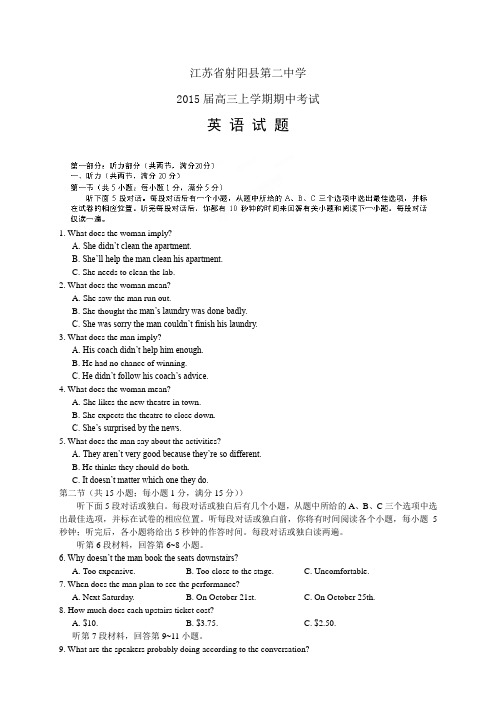
江苏省射阳县第二中学2015届高三上学期期中考试英语试题1. What does the woman imply?A. She didn’t clean the apartment.B. She’ll help the man clean his apartment.C. She needs to clean the lab.2. What does the woman mean?A. She saw the man run out.B. She thought the man’s laundry was done badly.C. She was sorry the man couldn’t finish his laundry.3. What does the man imply?A. His coach didn’t help him enough.B. He had no chance of winning.C. He didn’t follow his coach’s advice.4. What does the woman mean?A. She likes the new theatre in town.B. She expects the theatre to close down.C. She’s surprised by the news.5. What does the man say about the activities?A. They aren’t very good because they’re so different.B. He thinks they should do both.C. It doesn’t matter which one they do.第二节(共15小题;每小题1分,满分15分))听下面5段对话或独白。
每段对话或独白后有几个小题,从题中所给的A、B、C三个选项中选出最佳选项,并标在试卷的相应位置。
江苏省盐城市射阳县第二中学高中英语 活动单 Grammar 新人教版必修1

江苏省盐城市射阳县第二中学高中英语活动单 Grammar 新人教版必修1 Class____ Name________ Number_______“介词+ which / whom”引导的定语从句“介词+关系代词”引导的定语从句,是定语从句一种介词前置的定语从句句型,介词与关系代词之间存在一种介宾关系。
当关系代词在定语从句中作介词宾语时,把介词置于关系代词前,即演变出“介词+关系代词”句型。
例如:The man who/whom /that you spoke to is a teacher.=The man to whom you spoke is a teacher.一、基本构成1.“介词+关系代词”结构引导的定语从句中,关系代词只能用which(指物)或whom(指人) ,即:介词+which/whom。
(1)The man to whom you spoke is a tea cher.(2)The city in which she lives is far away.(3)The little girl is r eading a book, in which there are many cartoons.注意:当介词放在关系代词的前面时,用在介词后的关系代词不能省略。
2.在限制性定语从句中,当介词置于定语从句的谓语动词之后时,可用that/which(指物);that/who/whom(指人)作介词的宾语.且此处关系代词可以省略,特别是在口语中。
如:(1) The man (who/whom /that )you spoke to is a teacher.(2)The city(which/that)she lives in is far away.注:通常介词放在定语从句中动词后,也可以放在关系代词前面,但有些特殊动词短语搭配不能拆分,介词只能放在动词后,如: look for, look after, pay attention to ,take care of , look forward to, listen to等。
江苏省射阳县第二中学高三英语一轮复习虚拟语气教学案
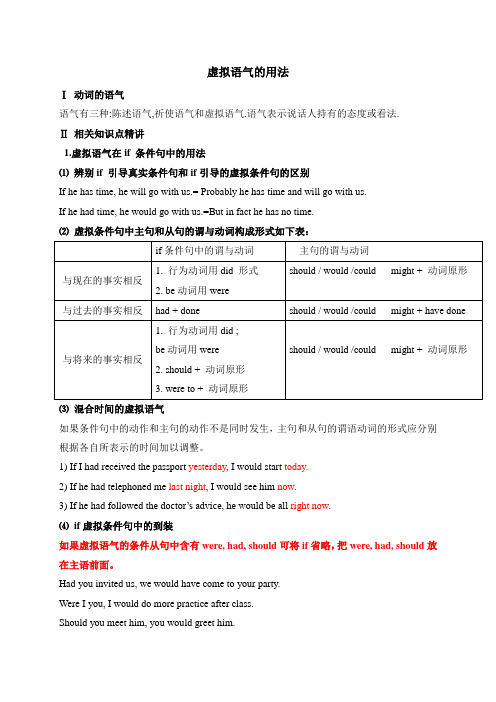
虚拟语气的用法Ⅰ动词的语气语气有三种:陈述语气,祈使语气和虚拟语气.语气表示说话人持有的态度或看法.Ⅱ相关知识点精讲1.虚拟语气在if 条件句中的用法⑴辨别if 引导真实条件句和if引导的虚拟条件句的区别If he has time, he will go with us.= Probably he has time and will go with us.If he had time, he would go with us.=But in fact he has no time.⑵虚拟条件句中主句和从句的谓与动词构成形式如下表:⑶混合时间的虚拟语气如果条件句中的动作和主句的动作不是同时发生,主句和从句的谓语动词的形式应分别根据各自所表示的时间加以调整。
1) If I had received the passport yesterday, I would start today.2) If he had telephoned me last night, I would see him now.3) If he had followed th e doctor’s advice, he would be all right now.⑷if虚拟条件句中的到装如果虚拟语气的条件从句中含有were, had, should可将if省略,把were, had, should放在主语前面。
Had you invited us, we would have come to your party.Were I you, I would do more practice after class.Should you meet him, you would greet him.2.虚拟语气在某些从句中的应用(1) 动词wish后的宾语从句, 表示不能实现的愿望,表示“但愿...;…就好了;可惜…悔不该…;①与现在事实相反的愿望,从句的谓动词用过去式I wish that he weren’t so lazy. I wish I were ten years younger.②与过去事实相反的愿望:用wish表示对过去事情的遗憾。
江苏省射阳县第二中学2022届高三(A)英语作业(10) Word版含答案

射阳二中2021年秋高三(A)英语作业(10)一、任务型阅读A篇Teenager bedwetting can be caused by a number of factors, some of which may be related to serious health issues. Bedwetting that starts suddenly can be a sign of serious trauma(创伤)or minor problems, like allergies. An isolated incident may be related to substance abuse.One of the major causes of teenager bedwetting is simple genetics. Some teenagers mature more slowly than others, some have underdeveloped bladders(膀胱), and some have a family history of bedwetting. Given that these problems are usually present throughout childhood, it is likely that teenage bedwetting due to these causes will have a long history. Most people do eventually grow out of this type of bedwetting.In some cases, teenage bedwetting can be caused by dietary changes. Increases in caffeine, dairy products, and other substances can cause a teenager to relapse(复发)into bedwetting. Isolating the problem can be difficult because the teenager may or may not be allergic to the substance.Emotional troubles sometimes lead to bedwetting as well. Stress and trauma, in particular, can lead to uncontrolled bedwetting. In some cases, a teenager may be hiding the source of the severe trauma and may not be willing to give information when confronted. Cases like these are often handled by psychologist.There are a number of causes of teenage bedwetting that relate to how urine(小便)is produced and the available space in which to store it. A teenager may for any number of reasons begin to produce excess urine. It is also possible that he or she has a small bladder that is not capable of handling the amount of urine produced at night. Having a small bladder does not necessarily imply that a person will wet the bed, so bladder size may not always provide a definitive answer. In combination with a sleep disorder, which may prevent the teenager from waking up when the bladder is full, these conditions can produce bedwetting.It can be hard to diagnose(诊断)the cause of bedwetting in teens, but understanding why a teenager is wetting the bed can be helpful not only for health but for emotional security as well. Teenagers are often ashamed of wetting the bed, and this shame may interfere with their other activities. By diagnosing the cause even if there is no cure, a teenager who suffers from bedwetting may experience an improvement in overall quality of life.B篇Think what you are!Carbon and oxygen taken together, one atom each, gives you the deadly gas carbon monoxide (CO) . On the other hand, these very two elements(成分)on some other proportion(比例)provide us with carbon dioxide(CO2), the harmless gas. When these basic elements can behave in this way so can the human mind!All human beings take in the air from this very earth, consume nearly the same kind of food and live under the same sky gaining energy from its only source Sun. Then what makes an individual distinct from each other? It’s the attitude, the behavior that distinguished one from another person. The thought process going on in our brains is what differs.Only our brains control our body, which in turn controls our living, our peace and happiness and overall progress as an individual. What we input is what we get. What we think is what we develop into. What we feel into our brains is what we get the outcome as. On harvesting good thoughts and positive attitude in our minds the good follows. Bad thoughts you get unconsciously should be removed and thrown off as soon as possible.Human body takes commands from its brains and works. Our brains are always functional. So any kind of thought developed in our brains remains there even when we are not aware of their presence. These thoughts are processed without our consciousness and the result follows. These outcomes can change our lives. At times when wrong words are spoken, they remain in our sub—conscious minds, without our awareness, and the wrong follows.Brain as a physical thing is not aware of what is right and what is wrong. When we think about things in some way, the perspective(看法)with which we look at them for the first time remains in our mind. Our mind intends to take this perspective as true and makes way for it to follow. So on thinking well, the good happens and wrong thought brings unhappy situations. Human beings learn from the situations faced in life and their thinking is affected by the circumstances faced. This in turn affects the thinking. Thus our life and our thoughts are mutually(相互的)related. To lead a good life it is desired to think good.So is rightly said, “What you think is not what you are …but what you THINK is what you are!”书面表达(满分25分)请阅读下面的短文,并依据要求用英语写一篇150词左右的文章。
江苏省射阳县第二中学2018届高三英语复习:定语从句基础知识二

When 引导的定语从句。
先行词是表示时间的名词,用when引导定 语从句。When在从句中作状语。
I’ll never forget the day when (= on which ) I met you.
This was the time when ( =at which ) he left for Beijing .
He referred me to some reference books _w_it_h___ which I am not very familiar.
Dolphins might be trained to cooperate with fishermen and help them by finding or even catching fish, __i_n___ all of which activities dolphins are interested.
year.
11.This is the room__i_n_w__h_ic_h___they once
lived.
12.I’ll never forget the day__o_n__w_h_i_c_h___ I
joined the army.
13.This is the reason__f_o_r_w_ h__ic_h___ I failed. 14.The pencil__w__it_h__w_h_i_c_h__he wrote was
28.This is the hotel __i_n_w__h_ic_h___ you will stay.
29.She is the girl _w__it_h_w__h_o_m___ I went there.
- 1、下载文档前请自行甄别文档内容的完整性,平台不提供额外的编辑、内容补充、找答案等附加服务。
- 2、"仅部分预览"的文档,不可在线预览部分如存在完整性等问题,可反馈申请退款(可完整预览的文档不适用该条件!)。
- 3、如文档侵犯您的权益,请联系客服反馈,我们会尽快为您处理(人工客服工作时间:9:00-18:30)。
定 The Restrictive Attributive Clause 限制性定语从句
语
从
句
The Non-Restrictive Attributive Clause 非限制性定语从句
The man who lives next to us sells vegetables. You must do everything that I do. I have found the book which I lost. I visited the school where I studied.
3) This is the pen (which) he bought yesterday.
4) The film (which) they went to see last night was not interesting at all.
2. that指人时,相当于who或whom;指 物时,相当于which。在定语从句中作 主语或宾语,作宾语时常可省略。
物 主语,宾语 作宾语可省
who
人 主语,宾语 作宾语可省
whom
人
whose (人/物)的
宾语 定语
可省 不可省
1. which指物,在定语从句中做主语或宾 语,做宾语时常可省略。
1) Football is a game which is liked by most boys.
2) He likes to read books which are written by foreign writers.
What does a relative pronoun function as?
1.Jack is a baby who/that is wearing
red trousers.
主语(subject)
2.Jack is a baby whose trousers
are red.
定语(attribute)
定语从句讲解
1. 定义:又称形容词性从句,在复合句中修 饰名词或代词,起定语作用。
2. 先行词:被定语从句修饰的名词或代词。
3. 关系代词\关系副词:引导定语从句的词。
关系代词 which, that, who, whom, whose,as Relative 在定语从句中作主语、宾语、定语 pronouns 和表语 关系副词 where, why, when Relative 在定语从句中作状语
works.
antecedent
先行词
relative adverb
关系副词
4. 15th Oct. 2003 was the day when Yang Liwei
was sent into the sky.
S=subject, P=predicate, O=object, Attr=attributive, Adv=adverbial
4) Yesterday I received a letter that/which came from Australia.
3. who指人,作主语或宾语 (作宾语可省 略)
The boys who are playing football are from Class One. A person who steals things is called a thief. 4. whom指人,作宾语 (作宾语可省略,如 介词提前则不能省) The man (whom/who) I talked to is Mr. Li. The man to whom I talked is Mr. Li.
adverbs
antecedent 先行词
The baby w_h_o_/t_h_a_t_is__w_e_a_ri_n_g_r_e_d___ t_r_o_u_se_r_s_is Jack .
relative pronoun 关系代词
relative pronouns
who whom whose that which as
3.Jack is a baby whom/who/that
I love most.
宾语(object)
4. Jack is no longer the lazy boy that
he used to be. 表语 (predicative)
关系代词要在从句中充当成分.
1. An astronaut is a person who works and travels
关系词whose实际上是先行词的所有格 The school where I study is far from my home. in the school = where 关系副词实际上是介词+先行词
关系代词的用法
指代内容 所做成分 是否可省略
that 人;物 主语,宾语 作宾语可省
which
in space.
antecedent
先行词
relative pronoun 关系代词
2. A space craft is a vehicle that / which can travel
in space.
3. A space capsule is a place where an astronaut
1) Where is the man that/whom I saw this morning?
2) The person that/whom you introduced to me is very kind.
3) The season that/which comes after spring is summer.
注意事项:
1.从句的位置: 先行词 之后
2.翻译方法: 3.构成
“….的” 关系
关系代词 关系副词
先行词和关系词的关系
A plane is a machine that can fly. the machine = that
The boy who broke the window is called Tom. the boy =who 关系代词实际上是先行词的复指 The boy whose parents are dead was brought up by his grandfather. the boy’s =whose
